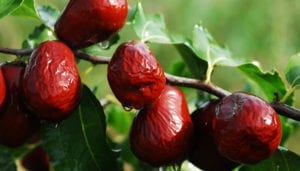News
Jujube genome study sheds light on fruit tree’s domestication

The jujube is an ancient fruit that is enjoyed by many in China, India and the Caribbean.
The high quality genome sequence of the dry jujube, along with sequences from trees throughout its range, have illuminated the domestication history of this ancient fruit tree, which humans have grown for more than 7,000 years.
Researchers at the Boyce Thompson Institute (BTI) collaborated with a group led by Xingang Li of Northwest A&F University in Yangling, China to sequence the dry jujube, or “Chinese date.” The study, published today in PLOS Genetics, identifies the genomic region underlying the sugar and acid content of the fruits, a key factor in jujube domestication. The researchers also identified genes involved in fruit texture and breeding compatibility. Breeders who are involved in the slow process of creating improved jujube varieties can use the sequences to help guide future breeding decisions.
Jujube is a popular dried fruit in China and other parts of Asia and the Caribbean. Chinese people alone produce more than four million tons of jujubes each year, with dry jujubes accounting for 80 percent of total production. The jujube varieties that are eaten fresh have a crisper texture, while dried ones tend to have flesh that is more coarse.
The researchers constructed a genome sequence for the dry jujube and compared it to sequences from 31 wild and cultivated trees. When researchers compared the genome of the dry jujube to the fresh one, sequenced by another group in 2014, they found several differences in genes related to cell structure.
“A lot of genes involved in cell wall metabolism were changed between the two species,” said BTI Associate Professor Zhangjun Fei. “Between the dried and fresh, the cell wall structure was totally different.”
They also identified regions of the genome responsible for higher sugar content and reduced acid levels in fruits that is similar across all cultivated varieties. These “selective sweeps” underlie the sweeter and less sour fruit uniformly selected by humans during domestication of the tree.
The genome can serve as a foundation for jujube breeders who want to improve jujube fruits or trees, and introduce new traits into the cultivars.
“Tree breeding and domestication is much harder than vegetables because it’s a long process,” said Fei. “One generation from seeds to fruit sometimes takes several years.”
Another issue is compatibility. Not all varieties can successfully interbreed. To assist with this problem, the researchers identified the genome region involved with self-compatibility, called the S-locus. They investigated sequence patterns in this region in the different jujube lines, to provide guidelines for parent selection for crossbreeding, the first step in traditional breeding.
The study’s finding may also be useful for breeding other fruit varieties, such as apples, where breeding cycles are long, and getting just the right mix of sugar, acid and fruit texture is vital to creating a delicious and marketable fruit.
Yang Bai, a postdoctoral researcher at BTI also contributed to the research.
The study was supported by grants from the National Science and Technology Pillar Program (2013BAD20B03), Key Project from the Government of Shaanxi Province (2013KTZB02-03-1), a Public Welfare Project from the Ministry of Forestry (201304110), the Fundamental Research Funds for the Central Universities (2014YB074), the National Natural Science Foundation of China (31372019), Talents Supporting Plan of Shaanxi Province, a special fund from the Key laboratory of Shaanxi Province (2015SZS-10), a special fund from NWAFU for the jujube experimental station (XTG2015002), and the United States National Science Foundation (IOS-1539831).

